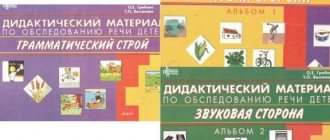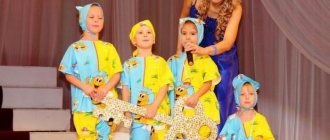Pedagogical advice on the topic: “Speech development in preschoolers: problems, solutions”
Recommendations: clearly and accurately formulate questions for children; include literary examples in the teacher’s speech (proverbs, sayings, poems)
2. Checking the documentation of teaching staff (Appendix 4.)
Analysis of the calendar planning of work on speech development indicates compliance with the requirements of the program, taking into account age characteristics, and the systematic nature of the material being studied. Teachers are always ready for classes and conduct them regularly. In the morning, teachers plan conversations, articulation, finger, breathing exercises, lexical exercises, word games aimed at expanding and activating the children’s vocabulary, individual work is planned, but vocabulary work with children is not always planned. In order for children to express their creativity, role-playing games, theatrical activities are systematically planned, and riddle evenings are organized.
An analysis of planning in preparatory groups for school showed that mainly traditional types of role-playing games are planned, which are characterized by an undeveloped plot, poor in content, and often have the nature of a game for only one day. Few dramatization games, director's games, or fantasy games are planned.
Plans for working with families of pupils include individual and group consultations, conversations, visual information in the parent corner, and exhibitions of special literature on children’s speech development.
Recommendations: Plan daily vocabulary work with children, individual work on the sound culture of speech, pay attention to speech education, setting and practicing the necessary sounds.
When planning role-playing games, plan the preceding and subsequent work (conversations, looking at paintings and pictures, etc.). Actively manage the role-playing game: teach role-playing actions, help carry out dialogues in the process of developing games, etc.
It is necessary to talk with parents, explaining to them the importance of children’s speech development and finding a timely solution to correct speech disorders. Organize thematic exhibitions for students and parents aimed at improving children’s speech. Show great creative initiative in working with parents on the speech development of pupils.
Duration - permanent, responsible - group educators.
3. Organization of a developing subject-spatial environment in groups (Appendix 2.)
In the groups, book corners have been formed in which literature is appropriately placed in accordance with the age of the children. Children love to look at illustrations and “read” books in the corners. The groups have didactic and printed board games. Card files of subject pictures for automation and differentiation of sounds; card index of articulation and finger gymnastics; There are manuals for developing fine motor skills, copywriting, lacing, finger games. The teachers have done a lot of work to create a play and theatrical area in the groups, and have selected attributes and masks for staging fairy tales. In groups No. 11, 10, 12 there are flannelographs and screens for acting out and showing theatrical productions.





